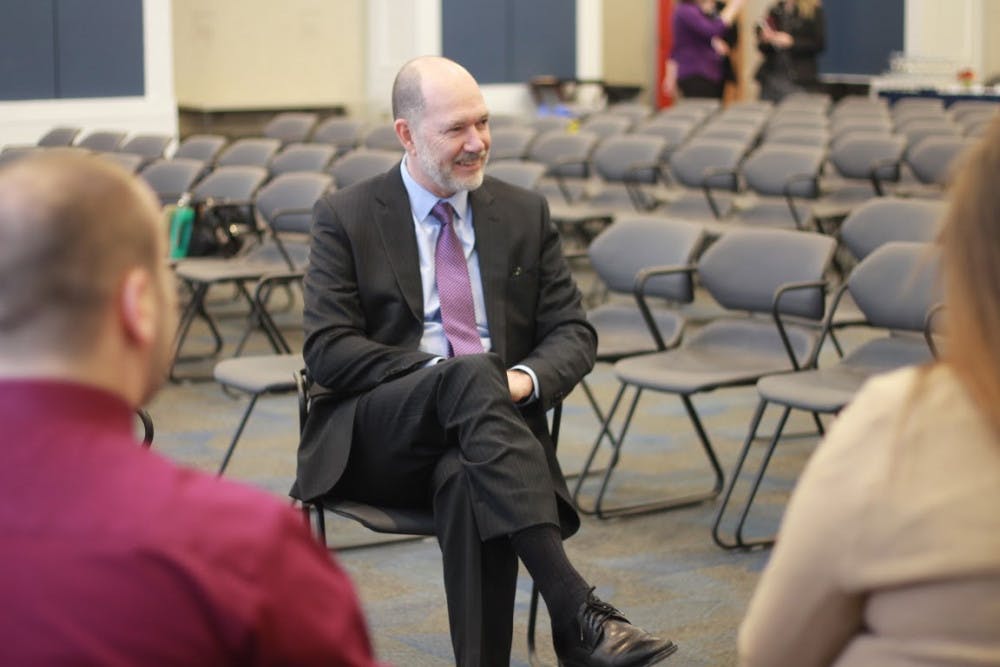By Leigh Cesanek
Correspondent
Kevin Kruger, president of the National Association of Student Personnel Administrators (NASPA), spoke about the major challenges facing higher education today and its effect on the future of colleges on Thursday, Feb. 26, in the College Education Building.

Vice President for Student Affairs Amy Hecht introduced Kruger as a notable speaker, leader and educator. Kruger’s background includes more than 30 years of experience in higher education. He has served as associate executive director of NASPA since 1994 and has been NASPA’s first executive-level president since 2012.
Kruger discussed a number of challenges faced by higher education administrators, including the increasing cost of college, demographic changes, the learning and achievement gaps facing our country, the impact of technology and sexual assault sweeping campuses across the country.
He explained that the rising cost of tuition has caused parents to question the value of higher education for their children. Yet, Kruger said, all the evidence suggests that college is in fact worth it.
He explained that one of the major complaints
associated with the high cost of college is the “administrative bloat.” This term refers to what some feel are unnecessary expenses, such as student affairs administrations. However, higher education costs have risen because of faculty salaries and cuts in state aid, he explained.
Another challenge for higher education is the drastic change in demographics, Kruger said. Immigration rates are predicted to climb, with Hispanics becoming a larger percentage of the population.
The challenge for this new generation of students will be that they come from low-income households and will have fewer resources, he explained. The issue for institutions is that revenues are not, and will not, be met because this next generation will not be able to sustain the cost.
In order to attract more students from farther, unreached audiences, Kruger said that higher education will be forced to decide whether to reduce its expectations of students to sustain revenues, cut tuition costs or market themselves.
The new generation will take fewer credits, be less involved on campus, attend school part-time and work part-time, he said. For these reasons, “it is more important for higher educators to engage these students,” Kruger said. According to Kruger, all of these factors can lead to lower retention rates for higher education.
For the future, lower-income students, Kruger suggests forming learning community groups to support the changing needs of students. He said that student affairs staff members will need to become “more generalists and less specialists” in order to meet the needs of this incoming generation.
The learning and achievement gap is another obstacle faced by higher education. The difference in the success of students who complete four years of higher education compared to the success of those who complete two years or even less, is becoming wider.
“Closing the achievement gap should be the civil rights movement of our decade,” Kruger said. “Providing students with cross-cutting skills that set them apart from others when searching for jobs after school is more important than a student’s major.”
Sexual assault becoming predominant on college campuses across our country is another issue that Kruger addressed.
“People can’t stop reading about it,” he said.
Changing the culture on campuses is a major challenge faced by higher educators, according to Kruger.
“We (higher educators) can’t just be crisis managers,” Kruger said. For that reason, higher education must focus on the importance of learning taking place “holistically.”
The impact of technology is another challenge higher education must deal with, according to Kruger. Technology itself is causing the nature of higher education to change by becoming available online. Students in the next generation, which he called “the freestyle generation,” can design their own college experiences.
Utilizing technology to create an environment where students can learn from many, instead of just one individual, should be the focus of higher education, he explained. To “be there (online) with them” is what Kruger suggests to higher educators, so as to create the best possible learning community for this generation.
The biggest pieces of advice that Kruger offered to his audience of higher educators at the College is to dream big, get stuff done, make a serious commitment to future challenges and focus on big goals.







